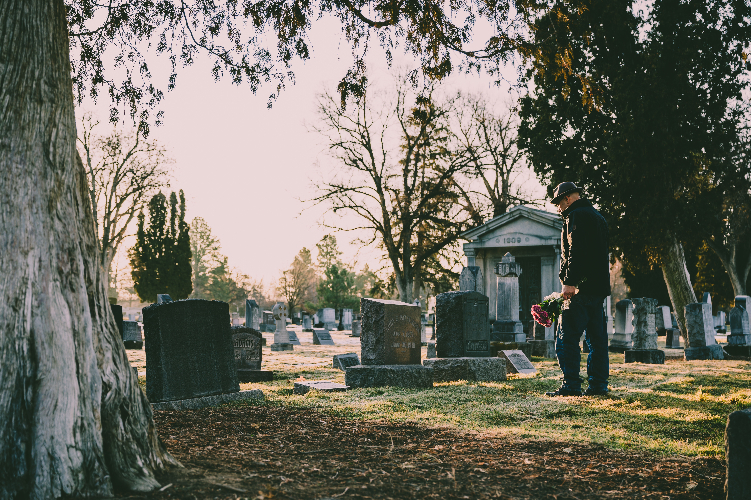Organising a loved one’s affairs after their passing can feel overwhelming, especially when you’re still grieving. But you don’t have to manage everything right away. Some practicalities will need to be taken care of immediately, and others can be dealt with weeks later. We’ll guide you through what you need to do when someone dies, with key steps to follow.
You can even use this as a ‘what to do when someone dies checklist’, to help you keep on top of things.
The process when someone dies is largely consistent within the UK. There are some regional variations, especially in Scotland, that we have highlighted when necessary.
These steps are for natural or expected deaths in the UK. If someone dies suddenly or unexpectedly then you should always call 999.
What to do straight away
What to do when someone dies at home, UK
When someone dies at home, you must let their GP know as soon as possible. If you’re not sure what to do when someone dies at home at night, or if you can’t get hold of the GP for any reason, call the NHS helpline (dial 111) and they’ll talk you through what to do next.
The GP will normally issue a medical certificate, detailing the cause of death.
What to do when someone dies in hospital
When someone dies in a hospital or care home, the staff there should take care of issuing a medical certificate. If the cause of death was unexpected, wherever it occurred, then a coroner (or procurator fiscal in Scotland) may need to be involved and a post-mortem conducted.
What to do within the first few days
Consider organ donation
If you know your loved one’s wishes regarding organ donation, that’s great. You can tell the doctor whether they wanted to donate or not, when notifying them of the death. It’s generally only possible for organ donation to take place when the person has died in hospital. If they died at home, and they wanted to donate, it might still be possible to make a tissue donation.
Tell close relatives and friends
Notifying relatives and friends can be an overwhelming task. If you can, try to split this up between close family members. You will also need to tell the person’s employer or landlord if they have one.
Make arrangements for any dependents
If your loved one was responsible for any people or pets, they will need temporary care until long-term arrangements can be made.
Register the death
In the UK you need to register a death within 5 working days, or 8 days if you’re in Scotland. The registrar will issue you with 3 certificates:
- The death certificate – keep 4-5 copies of this. These cost £11 per copy in England and Wales, £10 in Scotland, and £8 in Northern Ireland.
- The ‘certificate for a burial’. This should then be given to the funeral director, or used within the application for a cremation.
- The certificate for Department of Work & Pensions benefits. This is used to let HMRC know to adjust any relevant payments.
Keep belongings secure
If your loved one owned a car or a house, make sure that these are locked up and secure. You may also want to visit the house to check on anything that needs regular care (e.g. plants) and to clear out anything that might go off (e.g. food in the fridge). You could also pick up any post and ask the Post Office to forward on mail – this will help you to understand if there are any outstanding bills or accounts that need to be closed.
Check for a will
You don’t have to deal with the will straight away, but it’s always worth checking early on.
What to do when someone dies and leaves a will:
When someone dies and leaves a will, it often mentions a funeral plan or any last wishes, which can prove very useful going forwards.
What to do when someone dies without a will:
If your loved one died without a will, don’t worry, there are guidelines in place that we talk about in the ‘manage finances’ section.
Make funeral plans
Once the death is registered, you can start to make funeral plans. This is usually done through a funeral director but it’s possible to arrange a funeral yourself. You can also use the free tools within your In MemorE page to send funeral notices and manage RSVPs.
Funeral costs can be expensive, but you don’t have to struggle alone. If you get certain benefits or tax credits, you may be eligible to get a Funeral Expenses Payment, or you may be able to use your loved one’s estate or pre-paid funeral plan. You can also set up a funeral fundraiser to allow friends and family members to come together and contribute to funeral expenses, celebrate the life of a loved one and ease financial pressures.
Pay tribute
There are so many different ways to honour someone special, and your tribute should feel personal to your unique relationship. You may want to:
- Fundraise for a cause close to your loved one’s heart
- Write an obituary
- Keep cherished memories alive by adding photos, videos and messages to your online MemorE box
- Buy a memorial bench or plant a tree in memory
What to do in the weeks following a death
Notify organisations
You can use the Tell Us Once service to notify several government departments at the same time, including HMRC, Passport Office, DVLA and more. You will also need to ensure that you tell any banks, landlords, utility companies or housing associations.
Manage finances
This can be one of the most stressful things to deal with after someone dies. Make sure you have good support around you from family and friends.
First of all, you might want to claim on a life insurance plan, if there is one.
If your husband, wife or civil partner died within the last 21 months, you might be able to get Bereavement Support Payment. If you’re bringing up a child who has lost their parents, you could be entitled to Guardian’s Allowance on top of Child Benefit payments. It’s also worth checking if your benefits, tax and pension will change.
Applying for the right to deal with someone’s estate is ‘applying for a probate’. This process differs in Scotland and Northern Ireland. If the person who dies leaves a will, then someone will be named as the executor of the estate. If someone dies without a will, a close friend or relative will become an ‘administrator’ and intestacy rules will determine how the estate should be managed. Someone’s estate is made up of everything that they owned. This can include:
- Money (in cash or bank accounts)
- Property
- Possessions
- Shares
If you’re not sure what to do with shares when someone dies or how to manage their finances, (whether your loved one left a will or not), then it might be worth hiring a solicitor to help.
Take time for yourself
The loss of a loved one can be a life-changing event and an extremely personal experience. Everyone deals with grief in different ways, and it’s important to take time for yourself to grieve. If you’re struggling with grief, visit our grief support page.
You’re not alone
Find the perfect sympathy gift, create a funeral notice and keep precious memories alive by creating an online memorial.




